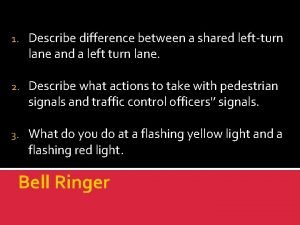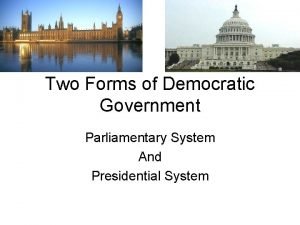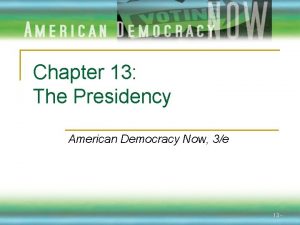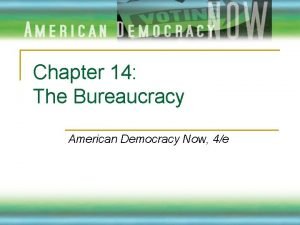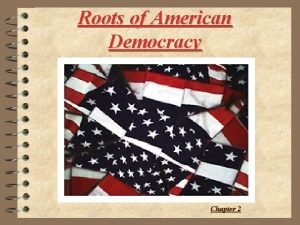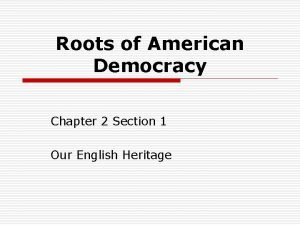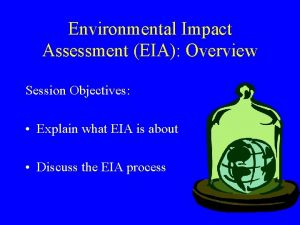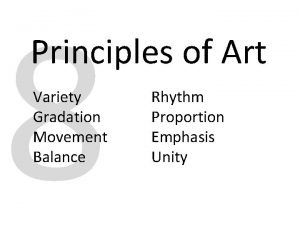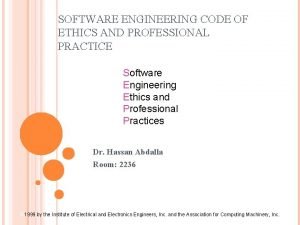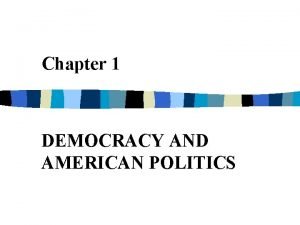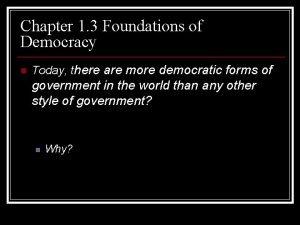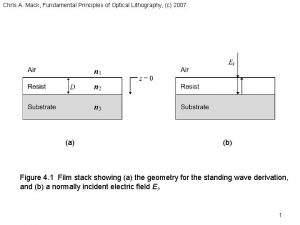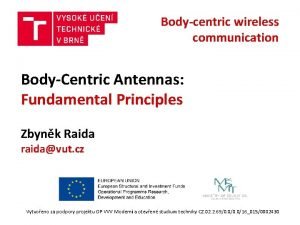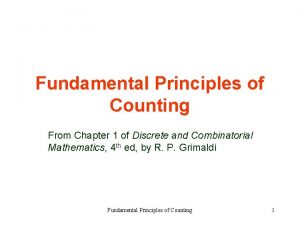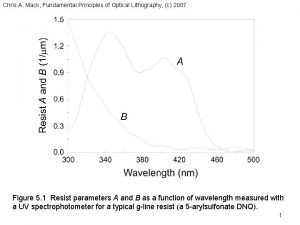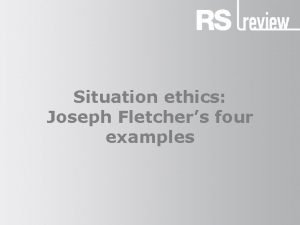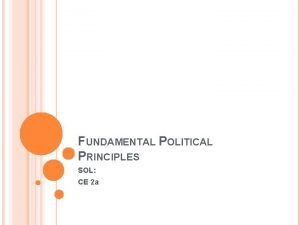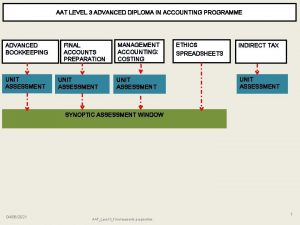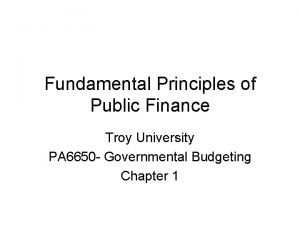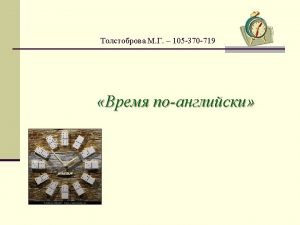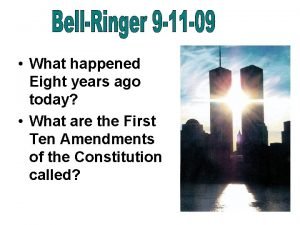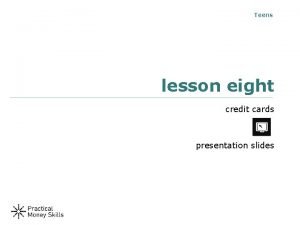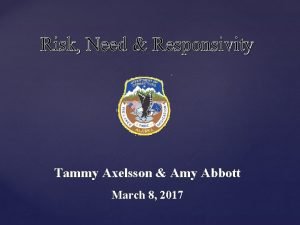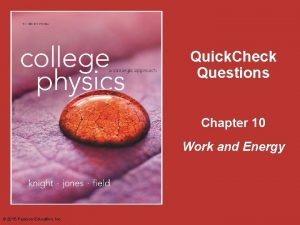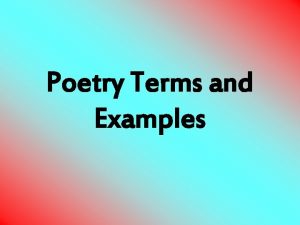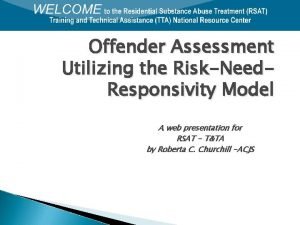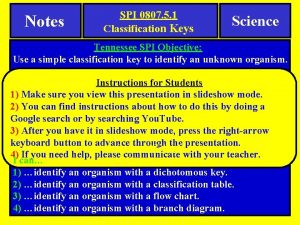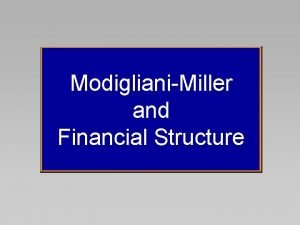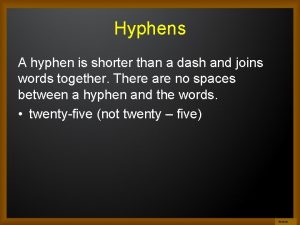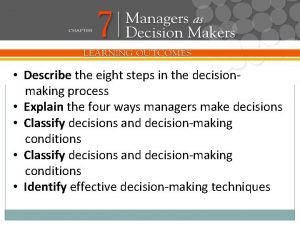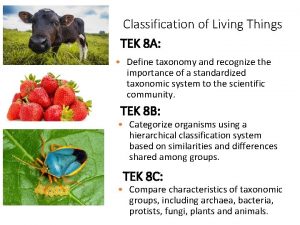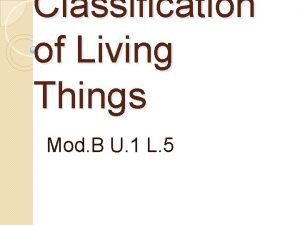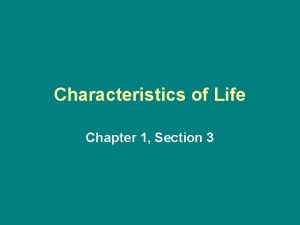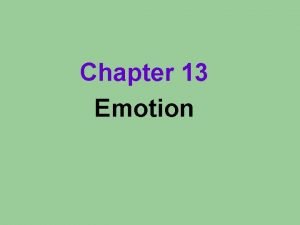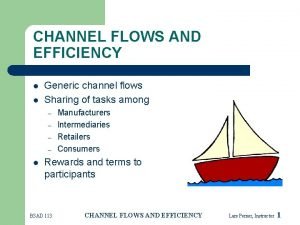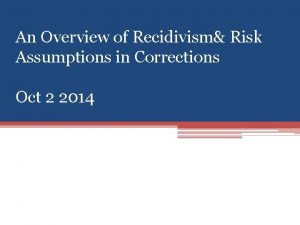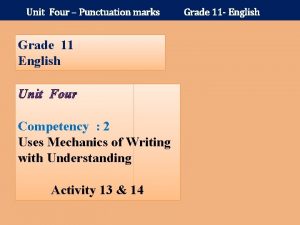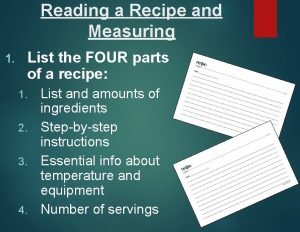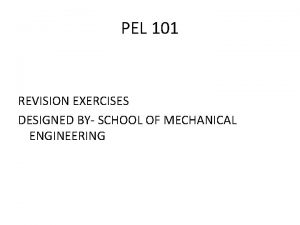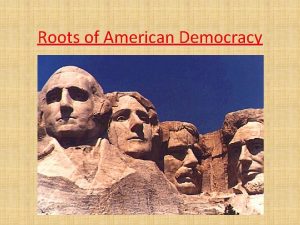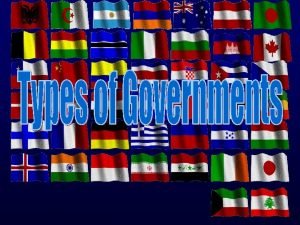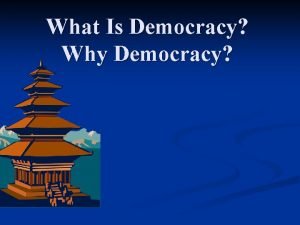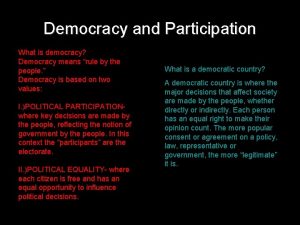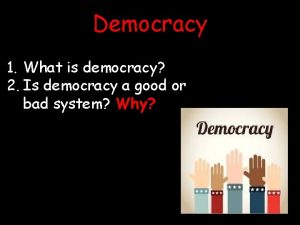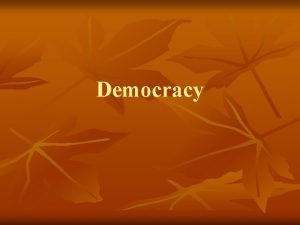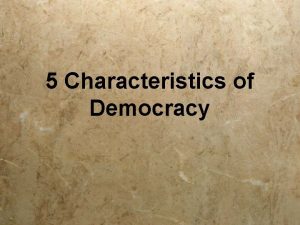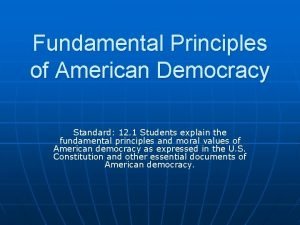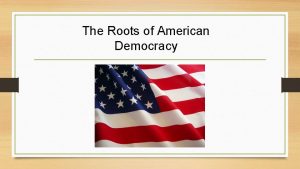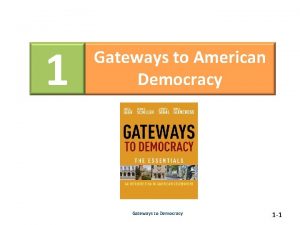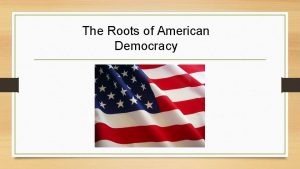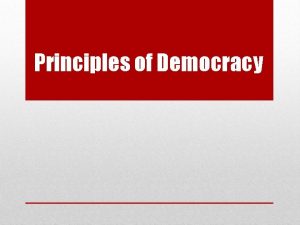Fundamental Principles of American Democracy Eight Fundamental Principles







































































- Slides: 71

Fundamental Principles of American Democracy

Eight Fundamental Principles of American Government are: • Popular Sovereignty: the people are the source of the government’s power – How? Voting!

Limited Government • Government is not all powerful • There are limits or checks on what the government may do



Separation of Powers • The division of the national government into 3 branches – Executive – Legislative – Judicial



Bicameralism • The division of the legislative branch into two houses – The House of Representatives – The Senate

Checks and Balances • The power granted to each branch to stop the actions of another



Judicial Review • The power of the Court to declare laws passed by Congress or actions of the President to be unconstitutional. • Formalized in the case of Marbury v. Madison

Federalism • A system of government in which power is constitutionally divided between the national government and the States with National supremacy. • Created by James Madison • “Unity without uniformity”

Adaptability • The idea that the Constitution can change over time – Formal Amendments – Interpretation

Example of Limited Government • United States v. Nixon – Background Information: • Watergate: Members of CREEP broke into DNC headquarters at the Watergate complex to steal campaign info. They got caught • Congressional committee investigates White House involvement • Committee Calls Mr. Butterfield (Nixon’s secretary) to testify. He reveals that Nixon has tapes of all conversation • Congress subpoenas the tapes. • Nixon refuses to turn over tapes citing Executive Privilege • Congress sues Nixon in the Supreme Court

United States v. Nixon • Nixon challenges Congress’ right to subpoena the tapes on the grounds of: – Executive Privilege – Separation of Powers

United States v. Nixon • Significance of the Case: The President is not above the law (limited government) • Results of the case: – Nixon must turn over the tapes – Presidents must follow the law (subpoenas) – Executive Privilege has limits

United States V. Nixon • Results of the Case: – House Committee receives tapes implicating Nixon and others – Committee recommends that the House impeach Nixon – Nixon resigns rather than face impeachment – Ford becomes President – Ford pardons Nixon

Nixon Resigns

Judicial Review • Definition: the power of a court to declare the laws or actions of government to be unconstitutional • Origins: – English Common Law (14 th century) – Supremacy Clause

Marbury v. Madison • Issues: – Can SCOTUS order the Exec to issue Marbury his commission? – Can SCOTUS declare the Judiciary Act unconstitutional? – Which branch of government has to power to say what the law means?

Marbury v. Madison • Facts of the case: – Pres. Adams appointed Marbury (and others) to be JPs for Washington, D. C. the week before he left office. – They were confirmed by the Senate. – The Commissions were left in the State Dept to be delivered. – Pres. Jefferson did not deliver the Commissions. – Marbury sued Sec. State Madison to force him to deliver the commissions.

Marbury v. Madison • Decision of the Court: – Marbury is legally entitled to his commission. – The Judiciary Act that gives the Court the power to hear this case on original jurisdiction is unconstitutional – The Court cannot grant Marbury his commission, he must sue in a lower federal court

Marbury v. Madison • Significance of the Case: – SCOTUS/ Chief Justice John Marshall guarantees itself the power of Judicial Review based upon Supremacy Clause in Article 6 of the Constitution – The Court declares itself to be the branch that determines what the law is/means

Marbury v. Madison • Principles involved: – Judicial Review – Supremacy of the Constitution (Article 6) – Judicial Restraint of presidential actions


Separation of Powers • The division of the national government into 3 separate, equal branches – Executive: President- enforces the law – Legislative: Congress- makes the law – Judiciary: Courts-interprets the law

Bicameralism • Division of the legislative branch into two Houses – House: tax, spend, impeach – Senate: convict, confirm treaties and appointments

Checks and Balances • The ability of each branch to stop the actions of the others to prevent tyranny.

Presidential Checks on Congress • Veto – most powerful check Pres has • Can call a special session of Congress (limited) • Can adjourn a session of Congress if they cannot agree on a date to leave • Can appeal directly to the public- only works if he is popular !

Presidential Checks on Courts • Appoints all Fed. Judges and Supreme Court Justices • “Court Packing”: trying to add more than 9 to the Court (hasn’t ever worked) • Appeal to the public (doesn’t work) • Pardon those convicted of federal crimes (can’t pardon self or Cabinet)

Congressional Checks on the President • Over-ride Veto (need 2/3 rd vote of both Houses…. Very rare!) • Impeach (means to charge w/ a crime) and Convict (means remove from office) • Approve Appointments to office (Senate) • Approve Treaties (Senate) • “Power of the Purse”: can deny funds • Investigate!




Congressional Checks on the Courts • Create lower federal courts (can delay a case getting to the SC) • Impeach and convict Judges/Justices • Approve all appointments to the federal bench (Senate) • Propose amendments to the Constitution


Court’s Checks on Congress and the President • Judicial Review: power to declare actions or laws unconstitutional • Significance: – Declaring something unconstitutional makes it illegal! – Only way to check this power is to amend the Constitution (27 of 20, 000+ have made it!)

Federalism • Division of power between that National government and the States w/ National Supremacy

Speed Limits by State

National Powers • • • Military International and Interstate Trade Regulation Immigration Citizenship Coining Money Etc…

State Powers • • • Regulation of Marriage and Divorce Public Education Setting election laws Deciding voter qualifications Licensing professionals Etc…

Adaptability • The ability of the Constitution to change to fit new times or situations • Formal Amendments: (change in words) – Proposal: * 2/3 rds vote both houses of Congress * 2/3 rds vote of National Convention – Ratification: • 3/4 ths vote of State Conventions (38 of 50) • 3/4 ths vote of State Legislatures (38 of 50)

Adaptability • Informal Amendments: (change in meaning with NO change in actual wording) – Basic Legislation (laws) – Executive Action (President’s War Powers) – Supreme Court Decision (interpret meaning) – Political Party Actions (Primary elections) – Customs and Traditions (Cabinet)

Government by Law • Definition: Government created by constitution or law, not by the whims of an individual • Significance: prevents government officials from taking too much power and provides for continuity in government (peaceful transition of power)

Supremacy Clause • Definition: the Constitution is the highest law • Ladder of Laws: – U. S. Constitution – U. S. Laws and Treaties – State Constitutions – State Laws – County Laws – Local Ordinances (City/Town Law) – ETC…

Representative Government • A form of government in which people elect delegates to make the laws • Other terms for this: – Republic – Indirect Democracy – Republican Democracy

Federalism • Definition: a system of government in which power is constitutionally divided between the national government and the States with national supremacy


Types of Congressional Powers • Expressed: the 18 specific powers granted in the Constitution • Implied: those suggested by the Necessary and Proper Clause • Inherent: those that belong to Congress because it is a legislature

Division of Powers in the U. S. Federal System • Delegated Powers: those that belong to the National Government ONLY • Reserved Powers: those that belong to the States ONLY • Concurrent Powers: those SHARED by the National Government and the States • Prohibited Powers: those that are forbidden to all areas of government

Major Delegated Powers of the National Government • • • • Coining money (C) Regulating interstate/international trade (C) Raising and maintaining the military (C) Commanding the military (P) Standardizing weights and measures (C) Granting patents, copyrights, and trademarks (C) Negotiating and signing treaties (P) Sending and receiving ambassadors/diplomats (P) Declaring WAR (C) Making Law (C) Enforcing Law (P) Delivering economic information to the people (P) Protecting the Rights of the People (J) Deciding Constitutionality (J)

Major Reserved Powers of the States Regulating marriage, divorce, and child custody Licensing of professionals Regulation of education Creation of local governments Legalizing/punishing gambling, drinking, prostitution • Deciding voting requirements • Holding elections • • •

Major Concurrent Powers • • • TAXATION! Spending and appropriation of funds Defining crimes Setting punishments Condemning property Eminent Domain

Major Prohibited Powers • Violating civil liberties/rights • Taking one’s life, liberty, or property w/out due process • Taxing slaves, bibles, heads, coffee, etc… • Granting titles of nobility • Passing a Bill of Attainder • Passing an Ex Post Facto Law • Denying Writs of Habeas Corpus

Cooperative Federalism • Definition: States are supposed to cooperate and work together with each other and the National government. • Guarantees of the Feds to the States: – Republican form of government – Protection • Foreign Invasion • Domestic violence (crime) • Natural Disasters – Territorial Integrity (protect borders)

Cooperative Federalism • States Obligations to the Feds – Obey the Constitution – Obey all federal laws – Enforce provisions of all US Treaties – Return fugitives (federal) – Abide by the Bill of Rights – Ensure equal protection – Etc…

States Obligations to Each Other • Interstate Compacts: “treaties” between States; require Congressional approval • Full Faith and Credit Clause: must recognize the validity of the laws and court actions of other States • Extradition: return of a fugitive to the State where indicted/convicted • Privileges and Immunities Clause: interstate citizenship; can’t unreasonably discriminate against residents of other States

Provisions for Statehood • • • Territory petitions Congress for permission Congress passes an Enabling Act Territory writes and ratifies State Constitution Congress must approve State Constitution Congress passes an Act of Admission Territory becomes new State

Current U. S. Territories • American Samoa • Guam • American Virgin Islands • Puerto Rico • Marianas Islands

The Texas Constitution • Commonalities in the 50 State Constitutions: – All contain provisions for civil liberties (Bill of Rights) – All have 3 branches – separation of powers – All include regulations for holding elections – All of them have limitations on government – All contain checks and balances (line-item veto) – All include voter qualifications/registration – All include property rights – All include eminent Domain – ETC…

Texas Constitution • Texans have lived under 7 Constitutions: – Colony of Spain – State in Mexico – Republic of Texas – State in USA – State in CSA – State in USA (Reconstruction) – Current State Constitution (USA) 1876

Texas Constitution • Current Texas Constitution was written in 1876 – Was written to replace the 1865 Constitution that was imposed on Texas by Reconstruction – During Reconstruction, Texans who fought for the Confederacy were denied the vote – Took away most of the powers of the Governor – Took away implied powers from the Leg.

Who wrote the 1876 Texas Constitution? • Most delegates were middle-class farmers and ranchers • Few had previous political experience • Most were members of the Grange

Why is the Texas Constitution so detailed? • The delegates wanted to strictly limit the powers of the Governor and Leg. • Didn’t want to allow the Texas Supreme Court to interpret any of the powers • Want the people to have the power to regulate the government (amendment process)

How can the Texas Constitution be amended? • Proposal of Amendments: 2/3 rds vote of the Texas House and Texas Senate • Ratification: majority of voters who vote on the amendment in a state-wide election

Examples of Amendments No religious test shall ever be required for public office Commitment against one’s will cannot exceed 90 days No imprisonment for debt Those who take their own lives shall vest as if it were a natural death • The Law of Primogeniture shall NOT be enforced in Texas • No convictions shall work corruption of blood • The Legislature shall have the power to regulate the wearing of guns with a view to prevent crime • •

Differences between Texas and US Constitutions Texas is longer (over 63, 000 words!) Texas has more amendments (over 400!) Texas has more Articles (17) Texas is very detailed; US very vague Texas governs only the State; US governs the nation • Texas written by middle-class farmers; US was written by wealthy, well-educated elites • • •

Weaknesses of Texas Constitution • Too much useless detail • Not responsive to emergencies in the economy • Must be amended very often (400+) • Contains many obsolete provisions (oldfashioned) • Controls the Governor and Legislature very strictly

Strengths of the Texas Constitution • Prevents abuses of power by strictly limiting the Governor and Leg • Each branch is elected directly by the people • It is very easy to amend to reflect changes in the State • There are no implied powers to interpret • The people of Texas have a greater voice in State government (amendments, initiative, referendum, vote for all officials, etc…)
 Whats a plane figure
Whats a plane figure A short section of corrugated roadway that warns of hazards
A short section of corrugated roadway that warns of hazards Parliamentary democracy vs presidential democracy
Parliamentary democracy vs presidential democracy Chapter 13 the presidency
Chapter 13 the presidency American democracy now chapter 14
American democracy now chapter 14 Chapter 2 roots of american democracy answers
Chapter 2 roots of american democracy answers Chapter 2 roots of american democracy answers
Chapter 2 roots of american democracy answers Eight guiding principles of eia
Eight guiding principles of eia The 8 principles of art
The 8 principles of art 8 principles of software engineering ethics
8 principles of software engineering ethics Struggle chapter 1
Struggle chapter 1 Basic principles of democracy
Basic principles of democracy 5 principles of democracy
5 principles of democracy Antecedents of modern quality management
Antecedents of modern quality management Principles of scouting
Principles of scouting What are the 3 fundamental principles of fingerprints?
What are the 3 fundamental principles of fingerprints? Mack
Mack Fundamental principles of wireless communication
Fundamental principles of wireless communication Fundamental principles of counting
Fundamental principles of counting Fundamental principles of optical lithography
Fundamental principles of optical lithography Fletcher 6 fundamental principles
Fletcher 6 fundamental principles Module 19 visual organization and interpretation
Module 19 visual organization and interpretation 5 fundamental political principles
5 fundamental political principles Aat fundamental ethical principles
Aat fundamental ethical principles Fundamental principles of public finance
Fundamental principles of public finance Fundamental principles of ship construction
Fundamental principles of ship construction It's five past seven
It's five past seven 8 years ago today
8 years ago today It's twenty to nine
It's twenty to nine Great gatsby chapter 8-9 summary
Great gatsby chapter 8-9 summary 8 sectors of tourism
8 sectors of tourism 8 elements of culture
8 elements of culture Lesson eight credit cards
Lesson eight credit cards Spot height symbol on a map
Spot height symbol on a map Eight generic channel flows
Eight generic channel flows Criminogenico
Criminogenico Robert pushes the box to the left
Robert pushes the box to the left I put my hat upon my head
I put my hat upon my head Two three four five six seven
Two three four five six seven Central eight risk factors
Central eight risk factors Zero one two three
Zero one two three What are the 8 levels of classification
What are the 8 levels of classification It's not how smart you are
It's not how smart you are Eight basic puzzles about financial structure
Eight basic puzzles about financial structure Lotf chapter 8
Lotf chapter 8 What rhetorical strategies are used in paragraph 25
What rhetorical strategies are used in paragraph 25 In a school assembly eight children
In a school assembly eight children Eight year old hyphen
Eight year old hyphen Villains archetypes
Villains archetypes Common factors of 8 and 36
Common factors of 8 and 36 Prominence news value
Prominence news value Sea eight maritime services
Sea eight maritime services Eight brief tales of lovers
Eight brief tales of lovers Qualitative research design
Qualitative research design Eight steps in the decision-making process
Eight steps in the decision-making process 6 faces 12 edges 8 corners
6 faces 12 edges 8 corners Addressing mode in computer architecture
Addressing mode in computer architecture What are the eight levels of classification
What are the eight levels of classification Living things mod
Living things mod Scientific taxonomy
Scientific taxonomy The 8 characteristics of life
The 8 characteristics of life What are the eight levels of classification
What are the eight levels of classification Eight core emotions
Eight core emotions Channel efficiency flow analysis
Channel efficiency flow analysis Balutan figure eight
Balutan figure eight Central eight risk factors
Central eight risk factors Macbeth act iv scene i
Macbeth act iv scene i Army 8-step training model
Army 8-step training model I am tired he muttered
I am tired he muttered Fifty past nine
Fifty past nine What are the eight steps to following a recipe correctly
What are the eight steps to following a recipe correctly At wendy's washateria all of the dryer
At wendy's washateria all of the dryer

